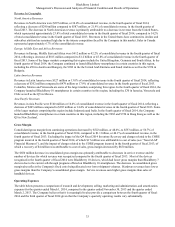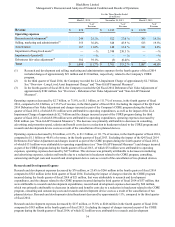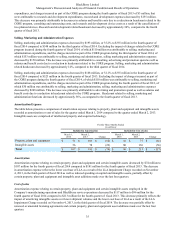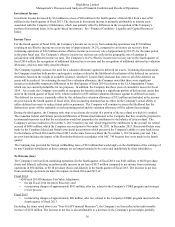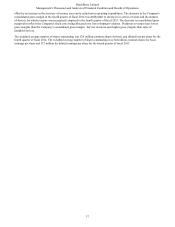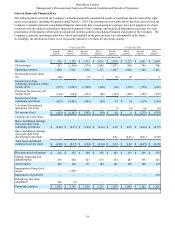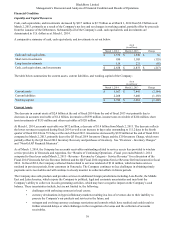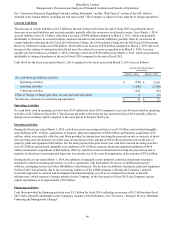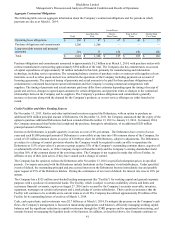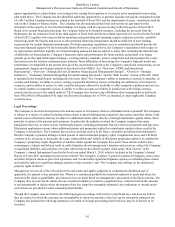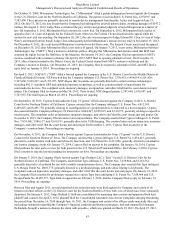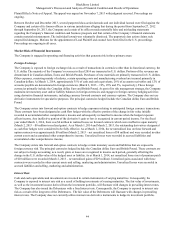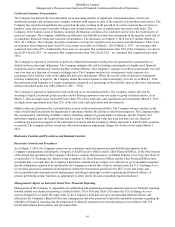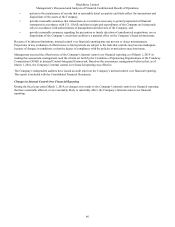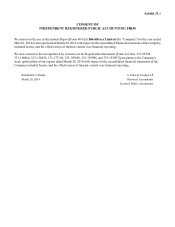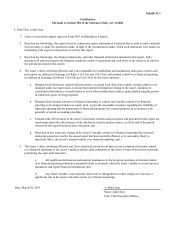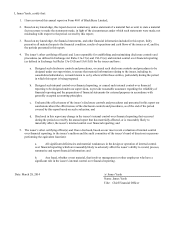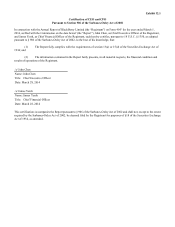Blackberry 2014 Annual Report Download - page 173
Download and view the complete annual report
Please find page 173 of the 2014 Blackberry annual report below. You can navigate through the pages in the report by either clicking on the pages listed below, or by using the keyword search tool below to find specific information within the annual report.BlackBerry Limited
Management’s Discussion and Analysis of Financial Condition and Results of Operations
43
On October 31, 2008, Mformation Technologies, Inc. (“Mformation”) filed a patent infringement lawsuit against the Company
in the U.S. District Court for the Northern District of California. The patents in suit include U.S. Patent Nos. 6,970,917 and
7,343,408. These patents are generally directed to remote device management functionality. A jury trial began on June 19,
2012. On July 13, 2012, the jury found that the Company had infringed the asserted patent claims, awarding damages of $147.2
million. On August 8, 2012, Judge Ware overturned the jury verdict and granted judgment of non-infringement as a matter of
law. On September 5, 2012, Mformation filed a motion for a new trial. On September 6, 2012, Mformation filed a notice of
appeal to the U.S. Court of Appeals for the Federal Circuit. However, the Federal Circuit deactivated the appeal while the
motion for new trial was pending. On September 20, 2012, the case was reassigned to Judge Edward M. Chen, in view of Judge
Ware’s retirement from the bench. Judge Chen subsequently denied Mformation’s motion for new trial on November 15, 2012.
On December 4, 2012, the court denied Mformation’s motion for relief from costs. The Federal Circuit reactivated the appeal
on December 20, 2012 after Mformation filed a new notice of appeal. On January 3, 2013, a new entity, Mformation Software
Technologies, Inc. (“MST”), filed a motion to substitute parties, alleging that Mformation had dissolved and that MST had
assumed the rights, but not the liabilities, to the litigation. On January 14, 2013, the Company filed an opposition to MST’s
motion, combined with a motion to dismiss. On April 8, 2013, MST filed its opening substantive brief. On November 21,
2013, after a limited remand to the District Court, the Federal Circuit denied both MST’s motion to substitute and the
Company’s motion to dismiss. On December 23, 2013, the Company filed its responsive substantive brief, and MST filed a
reply brief on January 9, 2014. Proceedings are ongoing.
On April 2, 2012, NXP B.V. (“NXP”) filed a lawsuit against the Company in the U.S. District Court for the Middle District of
Florida (Orlando Division). NXP asserted that the Company infringes U.S. Patent Nos. 7,330,455; 6,434,654; 6,501,420;
5,597,668; 5,639,697; and 5,763,955. NXP alleges that its patents are generally directed to certain wireless technologies
including 802.11 standards GPS and embedded memory technology, as well as certain methods of manufacture for
semiconductor devices. The complaint seeks monetary damages, an injunction, and other relief that the court deems just and
proper. The Company filed its Answer on May 30, 2012. Prior to trial, NXP dropped patents 5,597,668; 5,639,697; and
5,763,955. The trial began on March 24, 2014. Proceedings are ongoing.
On September 10, 2013, Cypress Semiconductor Corp. (“Cypress”) filed a lawsuit against the Company in the U.S. District
Court for the Northern District of California. Cypress asserted that the Company infringes U.S. Patent Nos. 6,012,103;
6,249,825; and 6,493,770, generally relating to reconfiguration of a peripheral device connected to a host computer. Cypress
also asserted that the Company infringes U.S. Patent Nos. 8,004,497; 8,059,015; and 8,519,973, generally relating to capacitive
touchscreens. The complaint seeks an injunction, monetary damages, and other relief that the court deems just and proper. On
November 4, 2013, the Company filed an answer and counterclaims. The Company asserted that Cypress infringes U.S. Patent
Nos. 7,834,586, 7,986,127, and 8,169,187, generally directed to USB charging. The counterclaims seek an injunction, monetary
damages, and other relief that the court deems just and proper. On December 2, 2013, Cypress filed an answer to the
Company’s counterclaims. Proceedings are ongoing.
On November, 4, 2013, the Company filed a lawsuit against Cypress Semiconductor Corp. (“Cypress”) in the U.S. District
Court for the Northern District of Texas. The Company asserted that Cypress infringes U.S. Patent No. 6,034,623, generally
directed to a radio modem with radio and telemetry functions, and U.S. Patent No. 6,833,686, generally directed to an adaptive
rate battery charging circuit. On January 13, 2014, Cypress filed an answer to the complaint. On January 30, 2014, Cypress
filed petitions for inter partes review for both patents in the U.S. Patent and Trademark Office. On February 4, 2014, Cypress
filed a motion to stay the lawsuit pending the inter partes reviews. Proceedings are ongoing.
On January 3, 2014, the Company filed a lawsuit against Typo Products LLC (“Typo”) in the U.S. District Court for the
Northern District of California. The Company asserted that Typo infringes U.S. Patent Nos. 7,629,964, and 8,162,552,
generally directed to a keyboard for use with a mobile communication device. The Company also asserted that Typo infringed
U.S. Design Patent No. D685,775, generally directed to a keyboard design, and trade dress relating to keyboards. The
complaint seeks an injunction, monetary damages, and other relief that the court deems just and proper. On January 22, 2014,
the Company filed a motion for preliminary injunction to enjoin Typo from infringing U.S. Patent No. 7,629,964 and U.S.
Design Patent No. D.685,775. Typo filed its opposition on February 5, 2014, and the Company filed a reply on February 12,
2014. Proceedings are ongoing.
Between May and August 2011, several purported class action lawsuits were filed against the Company and certain of its
present or former officers in the U.S. District Court for the Southern District of New York, two of which have been voluntarily
dismissed. On January 6, 2012, Judge Richard S. Sullivan consolidated the remaining three actions and appointed both lead
plaintiff and counsel. On April 5, 2012, plaintiff filed the Consolidated Amended Class Action Complaint, alleging that during
the period from December 16, 2010 through June 16, 2011, the Company and certain of its officers made materially false and
misleading statements regarding the Company’s financial condition and business prospects, and seek unspecified damages.
Defendants brought a motion to dismiss the claim with prejudice, which was granted on March 29, 2013. On April 25, 2013,


